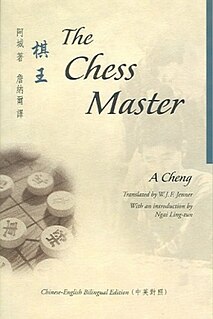 W
WThe Chess Master, is a 1984 novel by Chinese writer Ah Cheng, writing under his pseudonym A Cheng. This short novel features characters who were part of the Down to the Countryside Movement after the Cultural Revolution. Written from the point of view of an unnamed narrator, readers learn more and more about the titular character, the chess master Wang Yisheng, and what drives him to play Chinese chess.
 W
WChronicle of a Blood Merchant is a 1995 novel composed by Chinese writer Yu Hua. It is his third published novel after Cries in the Drizzle and To Live. It is the story of a silk factory worker, Xu Sanguan, who sells his blood over the years, in most cases in an attempt to improve the lives of himself and his family members, and overcome family difficulties. The story is set in the late 1940s until the 1980s, from the early years of the People's Republic of China until after the Cultural Revolution.
 W
WDeath Notice is a mystery/detective fiction novel and is the first novel in a trilogy by Chinese author Zhou Haohui. It was published in 2014 by Beijing Times Chinese Press. It was translated to English by Zac Haluza and published in 2018 by Doubleday.
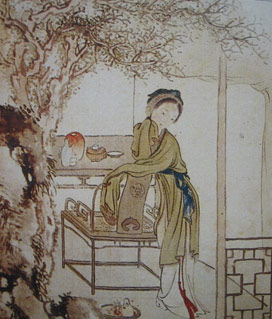 W
WDream of the Red Chamber, also called The Story of the Stone, or Hongloumeng, composed by Cao Xueqin, is one of China's Four Great Classical Novels. It was written some time in the middle of the 18th century during the Qing dynasty. Long considered a masterpiece of Chinese literature, the novel is generally acknowledged to be one of the pinnacles of Chinese fiction. "Redology" is the field of study devoted exclusively to this work.
 W
WEnglish (英格力士) is a 2004 Chinese coming-of-age novel by Wang Gang, about a boy growing up during the Cultural Revolution in remote Ürümqi, home to many political exiles including the boy's intellectual parents. English has been translated into English and many other languages.
 W
WThe Investiture of the Gods or The Creation of the Gods, even The Birth Of The Chinese Gods. also known by its Chinese names Fengshen Yanyi and Fengshen Bang (封神榜), is a 16th-century Chinese novel and one of the major vernacular Chinese works in the gods-and-demons (shenmo) genre written during the Ming dynasty (1368–1644). Consisting of 100 chapters, it was first published in book form between 1567 and 1619. Another source claims it was published in 1605. The work combines elements of history, folklore, mythology, legends and fantasy.
 W
WFire and Rain is a 1964 Taiwanese novel by romance novelist Chiung Yao. One of her best-known works, it has been adapted multiple times into film and TV dramas.
 W
WGeneral Yue Fei is a Chinese historical novel written by Qian Cai in the Qing dynasty. The first 61 chapters detail the life and adventures of Yue Fei. The last 19 concern the exploits of Yue Fei's son Yue Lei after Yue Fei's unjust death.
 W
WHalf a Lifelong Romance (半生緣) is a Chinese novel by Eileen Chang. It was initially serialized on a Shanghai newspaper Yi Bao (亦報) in 1948, under the title Eighteen Springs (十八春). The novel was published as a book in 1950. In 1966, Chang edited the book in the United States and republished it under the title Half a Lifelong Romance in Taiwan.
 W
WJin Ping Mei —translated into English as The Plum in the Golden Vase or The Golden Lotus—is a Chinese novel of manners composed in vernacular Chinese during the late Ming dynasty (1368–1644). The author took the pseudonym Lanling Xiaoxiao Sheng (蘭陵笑笑生), "The Scoffing Scholar of Lanling," and his identity is otherwise unknown. The novel circulated in manuscript as early as 1596, and may have undergone revision up to its first printed edition in 1610. The most widely read recension, edited and published with commentaries by Zhang Zhupo in 1695, deleted or rewrote passages important in understanding the author's intentions.
 W
WJourney to the West is a Chinese novel published in the 16th century during the Ming dynasty and attributed to Wu Cheng'en. It is one of the Four Great Classical Novels of Chinese literature. It has been described as arguably the most popular literary work in East Asia. Arthur Waley's popular abridged translation, Monkey, is well known in English-speaking countries.
 W
WLapse of Time is a 1982 Chinese novella by Wang Anyi. The novella follows Ouyang Duanli, a strong-minded Shanghai woman who worked hard to support her and her husband's large family during the Cultural Revolution when they were attacked as "former bourgeois".
 W
WLove in a Fallen City (傾城之戀) is a 1943 Chinese-language novel by Eileen Chang. It is also the first collection in English of the work of Eileen Chang, whom Ang Lee has called "the fallen angel of Chinese literature", the book is an original title in the NYRB "Classics" series.
 W
WLust, Caution is a novella by the Chinese writer Eileen Chang, first published in 1979. It is set in Shanghai and Hong Kong, Republic of China during the Second Sino-Japanese War. Reportedly, the short story "took Chang more than two decades to complete". The 2007 film of the same name by renowned Taiwanese director Ang Lee was an adaptation of this novel. The story focuses on the plight of Wang Chia-chih and her involvement in a plot to assassinate Mr. Yee, who is a co-collaborator of a Chinese collaborator with the invading Japanese force. The novella was allegedly based on a true story of the wartime spy Zheng Pingru. According to David Der-wei Wang, a Professor of Chinese Literature at Harvard University, Lust, Caution “drew controversy thanks to a biographical subtext: it seems to project Chang's own wartime experience as a collaborator's lover”.
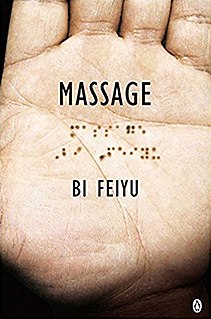 W
WMassage is a 2008 Chinese novel by Bi Feiyu about blind masseurs. It won China's most prestigious Mao Dun Literature Prize in 2011. The novel has been translated into English, German, Russian, Korean, and Japanese.
 W
WRed Sorghum: A Novel of China or Red Sorghum Clan is a Chinese language novel by Mo Yan. Published in 1986, it was Mo's first novel and remains one of his best-known works.
 W
WRemembrance of Earth's Past is a science fiction trilogy by the Chinese writer Liu Cixin, but Chinese readers generally refer to the series by the title of its first novel, The Three-Body Problem (Chinese: 三体; pinyin: Sān Tǐ; lit.: 'Three-Body').
 W
WThe Return of the Condor Heroes, also called The Giant Eagle and Its Companion, is a wuxia novel by Jin Yong. It is the second part of the Condor Trilogy and was preceded by The Legend of the Condor Heroes and followed by The Heaven Sword and Dragon Saber. It was first serialised between 20 May 1959 and 5 July 1961 in the Hong Kong newspaper Ming Pao.
 W
WRickshaw Boy or Camel Xiangzi is a novel by the Chinese author Lao She about the life of a fictional Beijing rickshaw man. It is considered a classic of 20th-century Chinese literature.
 W
WRomance of the Three Kingdoms is a 14th-century historical novel attributed to Luo Guanzhong. It is set in the turbulent years towards the end of the Han dynasty and the Three Kingdoms period in Chinese history, starting in 169 AD and ending with the reunification of the land in 280 by Western Jin. The novel is based primarily on the Records of the Three Kingdoms (三国志), written by Chen Shou.
 W
WThe Tale of Loyal Heroes and Righteous Gallants (忠烈俠義傳), also known by its 1883 reprint title The Three Heroes and Five Gallants (三俠五義), is an 1879 Chinese novel based on storyteller Shi Yukun's oral performances. The novel was later revised by philologist Yu Yue and republished in 1889 under the title The Seven Heroes and Five Gallants (七俠五義), with the story essentially unaltered.
 W
WThe Smiling, Proud Wanderer is a wuxia novel by Jin Yong. It was first serialised in Hong Kong in the newspaper Ming Pao from 20 April 1967 to 12 October 1969. The Chinese title of the novel, Xiao Ao Jiang Hu, literally means to live a carefree life in a mundane world of strife. Alternate English translations of the title include The Wandering Swordsman, Laughing in the Wind, The Peerless Gallant Errant, and The Proud and Gallant Wanderer. Another alternative title, State of Divinity, is used for some of the novel's adaptations.
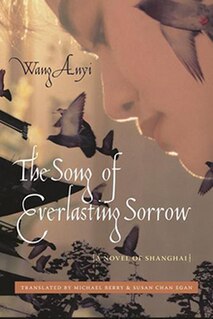 W
WThe Song of Everlasting Sorrow is a 1995 Chinese novel by Wang Anyi.
 W
WThe Three-Body Problem is a science fiction novel by the Chinese writer Liu Cixin. The title refers to the three-body problem in orbital mechanics. It is the first novel of the Remembrance of Earth's Past trilogy, but Chinese readers generally refer to the whole series as The Three-Body Problem. The second and third novels in the trilogy are The Dark Forest and Death's End.
 W
WTo Live is a novel written by Chinese novelist Yu Hua in 1993. It describes the struggles endured by the son of a wealthy land-owner, Fugui, while historical events caused and extended by the Chinese Revolution are fundamentally altering the nature of Chinese society. The contrast between his pre-revolutionary status as a selfish rich idler who (literally) travels on the shoulders of the downtrodden and his post-revolutionary status as a persecuted peasant are stark.
 W
WThe True Story of Ah Q is an episodic novella written by Lu Xun, first published as a serial between December 4, 1921 and February 12, 1922. It was later placed in his first short story collection Call to Arms in 1923 and is the longest story in the collection. The piece is generally held to be a masterpiece of modern Chinese literature, since it is considered the first piece of work to fully utilize Vernacular Chinese after the 1919 May 4th Movement in China.
 W
WWater Margin, also translated as Outlaws of the Marsh, Tale of the Marshes or All Men Are Brothers, is a 14th-century Chinese novel attributed to Shi Nai'an. Considered one of the Four Great Classical Novels of ancient Chinese literature, the novel is written in vernacular Chinese rather than Classical Chinese.
 W
WWives and Concubines is a 1990 novel by Su Tong that describes a college girl whose mind is broken by the concubine system in 1930s China. It was adapted into the 1991 film, Raise the Red Lantern, by Zhang Yimou. It has since been republished in the United States under the title Raise the Red Lantern in order to capitalize on the success of the film. It was also adapted by the Thai writer Taitao Sucharitkul as "Mong-Kut-Dok-som" (มงกุฎดอกส้ม), which means "the crown with orange flowers."
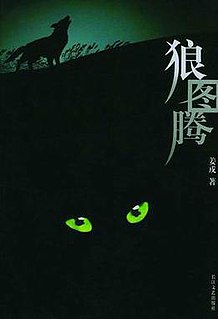 W
WWolf Totem (simplified Chinese: 狼图腾; traditional Chinese: 狼圖騰; pinyin: Láng Túténg is a 2004 Chinese semi-autobiographical novel about the experiences of a young student from Beijing who finds himself sent to the countryside of Inner Mongolia in 1967, at the height of China's Cultural Revolution. The author, Lü Jiamin, wrote the book under the pseudonym Jiang Rong; his true identity did not become publicly known until several years after the book's publication.